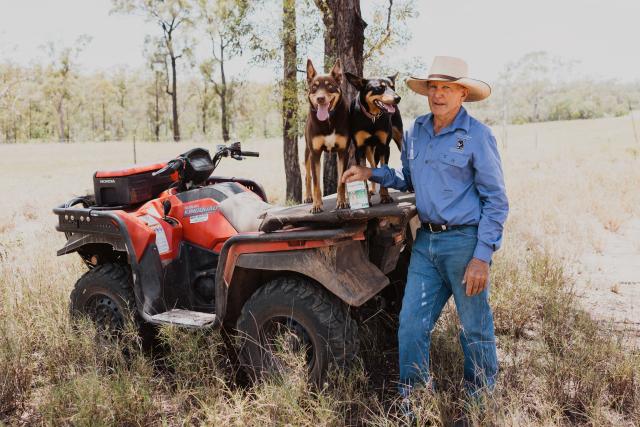Frank Finger – winner of the ABC’s Muster Dog program – knows a thing or two about training working dogs and preparing them for farm life.
The Clermont, Queensland cattle farmer transitioned to using working dogs on his property outside of Emerald in 1996 and hasn’t looked back.
He has been training working dogs for years and ensures the health and well-being of all his working dogs, declaring “without a healthy dog, you don’t have a dog.”
Frank shares his tops tips below to keep working dogs healthy.
Diet
To keep dogs fit and healthy, Frank feeds his dogs once a day on a diet of bones, boiled meat, rice and vegetables.
“I also use dry pellets as a back-up but too much of this gets boring for dogs and is akin to a person eating dry Weet-Bix for breakfast each day.”
Overweight dogs have a shorter lifespan and Frank notes overfeeding is an issue all dog owners should be aware of.
“Feeding dogs once a day is more than enough to keep them healthy.”
Importantly, regular monthly tape-worming and removal of raw sheep meat and offal from a dog’s diet can control tapeworms.
Sleep
Removing potential distractions is key to ensuring dogs get a good night’s sleep.
Frank’s dog kennels are divided so the dogs can’t see each other and any view of cattle, the house, or wildlife from the kennels is also blocked to remove distractions.
“This ensures the dogs get a good night sleep. If the dogs see cattle or other animals, they immediately start thinking about working, which is what you don’t want in the evening.”
Illness prevention
With research showing there is a one in 11 chance a dog has worms[1], investing time, guidance and care into a working dog to ensure their well-trained and healthy is all about looking after a mate.
Frank uses Simparica Trio®, a once a month tasty chew, to protect his dogs against deadly heartworm and treat and control fleas, ticks and intestinal worms.
“Simparica Trio is a very convenient once-a-month treatment. I give it to them just before they’re fed and the dogs don’t mind it at all.”
Barking
Minimising distractions is also important to reduce dogs’ barking, both in the evening and during the day.
One of Frank’s tips is to keep the radio on.
“I let them listen to music, the dogs love it, it’s just enough to keep their attention and makes any slight commotion, which may cause them to bark not as appealing.”
Communication
Communication is also key to rearing healthy, well-trained working dogs.
“Speaking as softly and calmly as possible will ensure happy dogs,” says Frank.
“They’ve got a good sense of hearing and owners and trainers don’t need to shout.”










